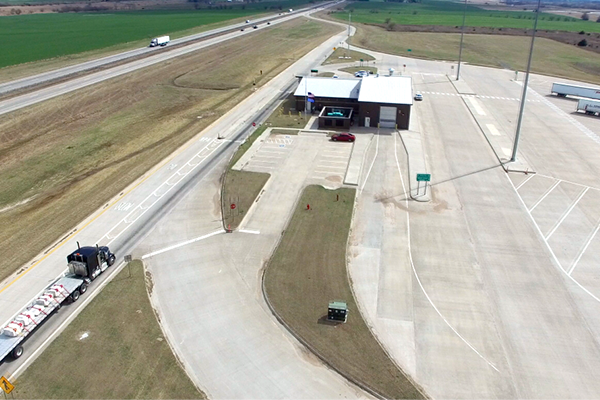OKLAHOMA CITY — The Oklahoma Corporation Commission’s Transportation Division issued 39,584 citations to motor carriers and commercial motor vehicles during the first nine months of this year, which produced nearly $8.5 million in fines.
In September alone, the division issued 3,549 citations that totaled $736,688 in fines, Darren Ferguson, the agency’s Assistant General Counsel for Transportation, informed the three Corporation Commissioners recently.
Almost 41% of the September citations (1,187 of them, totaling $300,100 in fines) were issued to drivers of overweight vehicles. Almost 10% of the citations (568) were written for drivers’ failure to carry/present their commercial vehicle’s registration or fuel license decal. And 9.2% of the citations (387) were for failure to register a vehicle, as required.
The remaining 1,407 citations were for infractions such as operating a commercial vehicle not having a current fuel license or decal, driver failure to yield for inspection of a vehicle, commercial vehicle bearing improper markings, vehicle weighing in excess of 80,000 pounds traveling on an interstate highway without a permit, driver refusal to weigh a commercial vehicle, a commercial vehicle engaged in interstate transportation with no active federal Department of Transportation number, failure to secure a load, truck and trailer exceeding permissible length, height and/or width, plus myriad other issues.
Responding to a question from Commissioner Bob Anthony, Ferguson said the Transportation Division collects most of what’s owed in fines. “Not much is outstanding,” he said. The “vast majority” of all violations are paid by credit card.
According to commission Public Information Manager Matt Skinner, $500,000 of the citation revenue collected each fiscal year is routed to the state Department of Public Safety and $300,000 is sent to the Oklahoma Tax Commission. The balance is earmarked for the Transportation Division’s compliance operations.
A little over 30% of the September citations (1,089) were issued to Texas drivers, slightly over 10% of the citations (363) were issued to California drivers, and 9.5% of the citations (337) went to Oklahoma drivers. The remainder were issued to commercial vehicle drivers from 43 other states, 30 were issued to Canadian drivers, and one driver from Mexico received a citation.
The Corporation Commission’s Transportation Division weighed 73,000 vehicles at static scales at various locations across the state, and 372,000 commercial vehicles were weighed via “weigh in motion” technology installed at state ports of entry, Ferguson said.
POEs have strips in the pavement that weigh trucks without them having to stop. When WIM indicates a truck has a weight issue, the driver is directed to static scales to have the vehicle double-checked, Skinner said.
“Sometimes a redistribution of the load can bring a truck back into compliance and no citation is issued,” he said.
Some of the citations are written for violations detected at the weigh stations, but the ports of entry account for most of the infractions cited in the tickets, Skinner said. The number of citations issued this year was probably lower than it otherwise would have been, he said, because the COVID-19 pandemic forced the temporary closure of some ports of entry.
The commission’s Transportation Division administers and enforces various federal and state trucking regulations and passenger carrier regulations relating to interstate and intrastate motor carrier licenses, permits, and certificates. In addition, the Transportation Division registers commercial motor vehicles through the International Registration Plan.
The Transportation Division has several administrative and enforcement responsibilities relating to interstate and intrastate motor carriers and commercial motor vehicles. Those responsibilities include commercial trailer registration, administration of the international fuel tax agreement and the IRP.
The division also issues various permits such as deleterious substance transportation permits, hazardous waste registrations and permits, overweight and over-axle permits, and temporary harvest permits that authorize intrastate operating authority for transportation of farm products in a raw state for commercial purposes.


